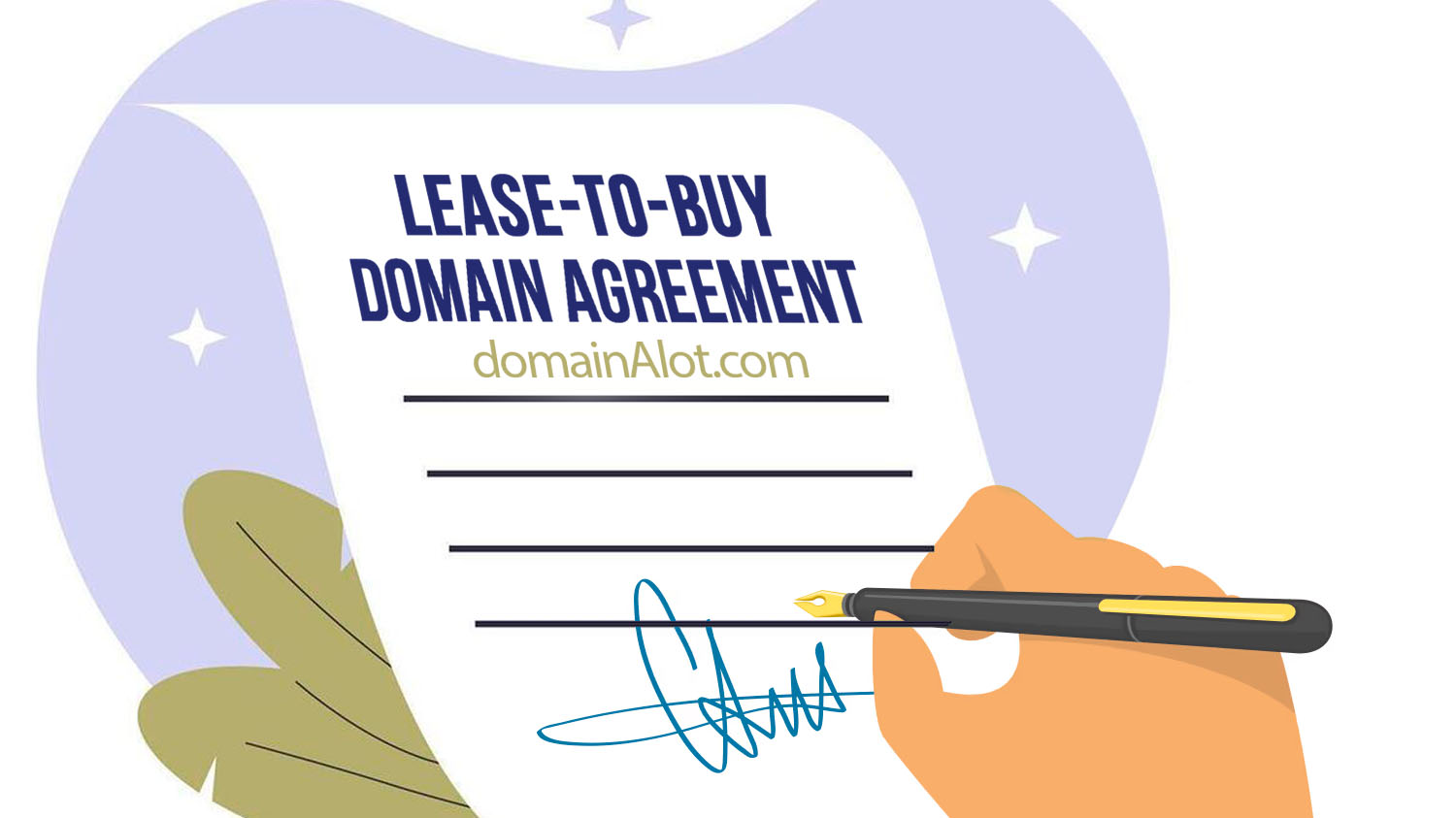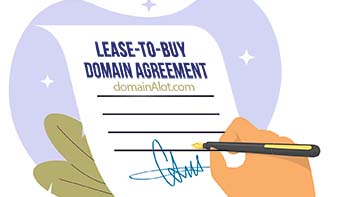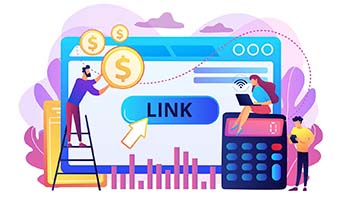The Definitive Guide to Lease-to-Buy Domain Agreements
Don't Compromise On The Digital Presence You Want - Get The Domain Your Project Deserves

When most people think about acquiring a domain name, they imagine either buying it outright or renting it for a period of time. But there's a third option that sits between those two, and it's one that many businesses, startups, and entrepreneurs overlook: lease-to-buy.
Lease-to-Buy, or Lease-to-Own as it is often also called, is a domain model that can be one of the smartest ways to secure the digital address you want without the need to lay down the full upfront cost in advance. If you've never considered it before, you might be surprised at how flexible and practical it can be, and why more and more people are turning towards Lease-to-Buy as the preferred method to acquiring valuable, traffic driving domains.
What Exactly Is Lease-To-Buy And How Does It Work?
At its simplest, a lease-to-buy agreement allows someone to lease a domain for a set monthly payment while keeping the option to purchase it outright at a later date. You might think of it as being very much akin to leasing a car. Ultimately, you want the car now but you don't have the kind of money required to purchase it outright. So, by making smaller, regular payments, you are able to begin using the car immediately, with the possibility of eventually owning it, further down the road (excuse the pun) should you decide you want to keep it.
For domain owners, this model creates recurring income while still leaving room for a larger payoff if the buyer decides to complete the purchase during their journey. For lessees, it provides an affordable way to access a premium domain name that might otherwise feel financially out of reach. In other words, lease-to-own represents a practical "win-win" agreement for bother parties that would otherwise see a valuable domain name potentially go unused as the owner awaits a buyer, and the lessee forced to register an alternative and less attractive domain that would require greater effort and resources to market in the hope of attracting users.
Advantage
One of the biggest advantages of lease-to-buy is that it lowers the barrier to entry.
Many premium domains come with price tags in the thousands or even tens of thousands of dollars. For a startup or small business trying to get off the ground, writing that kind of check up front isn't a viable option, or an idea that is anywhere near realistic. But spreading the cost out over a year or more makes it highly manageable. More importantly, because you get to use the domain immediately, you can start building your brand, and generate revenue before you've even come close to paying for it in full.
Not Just A Viable Option
Imagine a humanitarian NGO, a charitable organisation, or an independent startup that is simply fed up with the state of the current political climate. They are tired of reading about the ongoing war in Ukraine, of seeing reports about the atrocities in Gaza, of hearing about political violence, and learning about corrupt politicians. They would not be alone, in fact, many might say they are frustrated by the responses and approaches of government to resolve such conflicts. In their frustration, the humanitarian NGO decide to create a platform for open-speech and neutrality. A platform for uncensored political opinion and debate to discuss local, national or even international politics and events in the hopes of uniting individual voices into one that is loud enough to be heard and hard to ignore. In their search for a relevant brand and domain name, those that are free to be registered are difficult to spell at best and impossible to remember at worst. In an ideal world, what they really need to stand out is something directly related to politics. In fact, if the domain was just about politics (JustAboutPolitics.com) then they would also benefit from having a highly valuable and relevant keyword in their domain name (politics). Sadly, every type and variation of politics or about politics is already taken and registered. Many of these domains are simply taken by cybersquatters looking to make a pay day with an overinflated domain for sale, but this is the challenge every startup faces when considering a brand for their needs.
They stumble across a domain that would be perfect. It's short, catchy, easy to remember, and has the benefit of being universal. JustPolitics.com. It's precisely what they're looking for. A premium .com domain. It has the relevant keyword in the domain name itself. And it lets users know exactly what they can expect. I.e. on this website, community, or platform it's just politics. Pure and simple. That's it. Nothing else.
Fortunately, the domain is for sale. However, it's a premium domain and those can be expensive. Very expensive. In this case, the owner is willing to sell the domain for around $50,000 (USD). It doesn't help that the domain itself is valued at much more than this, because the fact of the matter is that the startup would need to use almost all, if not all of it's seed investment money just to buy the domain, which means the project would suffer due to the need to be down prioritise other business critical areas.
This is where a payment model like lease-to-buy comes into its own. Under a lease-to-buy agreement, the same domain is available for just $375 (USD) per month, and of course, the startup can begin promoting their service from the outset. So, even after a full year of use, growth, and traction, the startup has still only paid just nine percent (9%) of what they would otherwise have had to have paid to use the domain had they been forced to buy it outright. And that other ninety-one percent of the budget? Well, that was used by the organisation in other essential areas to allow them to turn their project into a self-sufficient business.
One-Size Does Not Fit All
Another advantage of lease-to-buy is its flexibility.
Every lease-to-buy deal can be structured differently. Some agreements are short, running from six months to a year, while others might stretch to three or more years and offer discounted rates. Some include the option to buy at a fixed price at any point during the lease, while others apply part of the lease payments toward the purchase price if you decide to buy. In other words, it's not a one-size-fits-all model. Buyers and sellers can negotiate terms that make sense for both or rely on independent third parties to broker an optimal deal on their behalf.
The Buyout Option
Let's imagine another example. To be outlandish, suppose an amateur herbalist has discovered a way to regrow hair. Great news for bald men everywhere, right? The herbalist wants to build their business around a strong digital presence, in fact, it would be the only way to build it. After finding the perfect domain name (Replacement.Hair) they also discover that the domain is listed for sale at $9,000 (USD). That's a lot less than fifty, nevertheless, for someone holding down a steady nine-to-five job, mortgage payments and a household with children, it might as well be the same. Without savings or being eligible to take up a bank loan, the herbalist simply has no means of acquiring the domain. Their business idea is over before it began, much to the lament of bald men everywhere. However, it doesn't have to be. Through a lease-to-buy domain agreement, the herbalist agrees to pay just $65 per month over a thirty-six month leasing term, with the option to purchase the domain outright at any time during the lease. The agreement itself can be structured in multiple ways, for example, a lower monthly payment would mean that should they take up the option to buy, the amount outstanding could be paid as a lump sum to secure the purchase. Alternatively, they could agree a higher monthly sum so that after three years, if they've kept up with payments, they've essentially paid the full $9,000 and the domain transfers into their ownership. Likewise, if their business takes off sooner and they want to accelerate the deal, they can exercise the buyout option early.
The point is, that with a structured lease-to-buy agreement, both parties can achieve greater flexibility in payment, and in determining the timing of transfer in ownership.
A Seller's Perspective
From the seller's point of view, lease-to-buy can be a win as well. Domains can sit idle for years waiting for the right buyer at the right price. One only has to look at domain aftermarkets like Sedo to see that there are literally millions and millions of registered, but unwanted, domains awaiting to be sold. A lease-to-buy agreement brings in immediate income while keeping the long-term upside intact. Even if the lessee walks away at the end of the lease and decides not to invoke the buyout clause, the seller has collected steady payments and still owns the domain. And if the lessee does complete the purchase, the seller receives their asking price, just spread out over time.
Commitment and Trust
Of course, lease-to-buy isn't without its challenges. One potential downside for the lessee is commitment, because once you start leasing a domain, you're invested. You are essentially investing time, money, and brand equity into something that you don't yet own. For some, the concept of leasing, albeit for a home, a car, or a domain, is difficult to accept. The fact remains that if you fail to meet payments, the deal will be forfeit, and if it does, you may find yourself needing to rebrand. That risk is real, though it's no different than renting office space or equipment while building a business. So, if you can accept that once you commence your lease, you will need to continue your payments just like every other type of lease, then it's easy to see that the benefits of lease-to-buy domain agreements more than outweigh any potential limitation.
For sellers, the main concern is trust. What happens if the lessee stops paying? This is where agreements need to be clear and enforceable. Most lease-to-buy contracts include clauses that return the domain to the seller if payments stop, along with forfeiting any money already paid for time rendered. Remember the digital asset is, and remains, the property of the seller until the domain is paid for, so the onus of responsibility to make payments and ensure the domain is ultimately paid for remains with the lessee at all times.
The vast majority of lease-to-buy agreements, such as those provided by domainAlot.com, provide added protection to both parties through the use of escrow services to ensure security and peace of mind. Any domain owner or lessee engaging in a lease-to-buy arrangement should consider carefully the protection escrow services provide and consider the risks of engaging in an agreement without the use of escrow security.
Appraisal And Pricing
The difference between what a domain owner thinks their domain is worth and what a domain is actually worth can sometimes be staggering. More often than not, it's usually substantial.
A domain owner can easily over estimate the value of their domain. Not because they necessarily mean to, but because it's difficult to be objective about something you own, value, and have great attachment to. For these reasons, it's highly recommended to use domain broker services, such as domainAlot.com when it comes to valuing, selling or offering a domain for a lease-to-buy agreement.
While many domain brokers charge fees for services such as domain appraisal, or use a.i. algorithms to perform "best guess" values for self-appraisal, the problem is that these tools simply cannot understand many of the metrics and criteria that define the current market, which generally results in an overpriced valuation.
What makes domainAlot.com unique is that we allow domain owners to determine their own pricing. We do not force them to agree with our valuation, or refuse to allow their domains to be listed if they disagree with a valuation. Instead, domainAlot.com provides free advice, free human appraisal, and support in helping domain owners correctly position their domains to increase the opportunity for sale and/ or lease-to-buy. This is what makes domainAlot.com truly unique for domain owners as well as fair and transparent for lessees and interested domain buyers.
And why is pricing so important? Well, for one thing, any lease-to-buy agreement is essentially based upon the value of the domain. If the value is overly inflated, then of course any monthly leasing fee related to the domain will be unrealistically high.
In simple terms, setting the right monthly lease amount and final buyout price requires balance. Too high, and you discourage potential buyers. Too low, and you may undercut the value of your asset.
Some sellers like to sweeten the deal by offering discounts for longer-term commitments. For example, leasing for one year might be at full price, but leasing for three years includes a reduced total cost. That kind of incentive can encourage buyers to commit longer while still ensuring fair value for the seller.
Ultimately, the domain owner is responsible for setting the premise for their domain. However, no matter the terms and conditions set or agreed, it is important for any potential lessee to consider the risk of entering into a lease-to-buy agreement with the domain owner privately. It is not recommended. In fact, we believe that you should never expose yourself to such risk, and quite simply, there's no need to. Any lease-to-buy arrangement you consider should always be performed through an external broker, such as domainAlot.com.
Alignment
The pros and cons of any lease-to-buy domain agreement highlight one key point: lease-to-buy is all about alignment.
When both sides have a clear understanding of expectations, timelines, and goals, it works smoothly. Buyers get immediate use of the domain and a path to ownership, while sellers get both recurring income and the chance at a full sale. When expectations aren't aligned, friction happens, and a seemingly straightforward arrangement can quickly go south.
Another important factor, and one worth mentioning is perception. Using a lease-to-buy model shows that domain ownership is becoming more professionalised and creative. Just like real estate or vehicles, premium digital assets can be accessed in multiple ways and not only by being purchased outright. This kind of flexibility helps the domain industry evolve and adapt to a wider range of users.
Consider The Deal
If you're considering a lease-to-buy deal, whether as a buyer or seller, and whether choosing a marketplace like domainAlot.com or not, the best advice I can give is to do your homework.
Buyers should think carefully about how central the domain is to their brand and whether they're committed to eventually owning it.
Sellers should think about what makes financial sense for them. If you don't want to take advantage of the convenience of domainAlot.com, then consider how to structure your deal while protecting ownership. And it goes without saying that should you decide to try leasing your domains yourself, then you should really use secure platforms as well as legal contracts to formalise any arrangement.
Explore The Possibilities
The lease-to-buy model might not be right for everyone. Some buyers prefer to pay once and move on, while some sellers prefer a lump sum upfront. But for many, it offers the right mix of affordability, flexibility, and opportunity. It bridges the gap between renting and owning, giving startups and businesses a chance to access the domains they need now while still working toward ownership.
Looking ahead, it's easy to imagine lease-to-buy becoming more common, if not the norm for domain use. As more businesses recognise the value of premium domains and the internet continues to grow, demand will rise. At the same time, not everyone can write a big check on day one. Lease-to-buy provides a middle path that works for both sides, and it may well become a standard option in domain marketplaces.
Whatever the future holds, at the end of the day, domains are more than just addresses. They're brands, identities, and opportunities. Lease-to-buy is simply another way to make those opportunities accessible.
Whether you're a business owner dreaming of the perfect name or a domain investor holding a valuable asset, it's worth considering this model. It may be the tool that helps bridge the gap between ambition and reality.
If you're ready to explore the possibilities, platforms like domainAlot.com are making it easier than ever. In fact, you can list your domain for sale, lease, or lease-to-buy in under two minutes, and determine every critical aspect of your lease such as maximum term and discount pricing while doing so.
Likewise, if you're on the lookout for a way to gain instant competitive advantage and awareness for your project or startup then there's simply no better way to achieve it than through a market relevant premium domain. But if project costs and budgets have been restrictive in the past, then remember, through a model like lease-to-buy, you no longer have to compromise or settle for anything other than the digital presence you really want. The perfect name is out there, and now, it can come with greater, more flexible options, which means it might be within reach and even closer than you think, or ever dared to dream...





